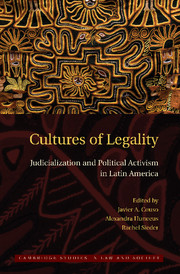Book contents
- Frontmatter
- Contents
- Contributors
- PART I INTRODUCTION
- PART II COURTS AND JUDICIALIZATION THROUGH A CULTURAL LENS
- PART III JUDICIALIZATION BEYOND THE COURTS
- 6 The Transformation of Constitutional Discourse and the Judicialization of Politics in Latin America
- 7 Legal Cultures in the (Un)Rule of Law: Indigenous Rights and Juridification in Guatemala
- 8 Political Activism and the Practice of Law in Venezuela
- 9 The Mapuche People's Battle for Indigenous Land: Litigation as a Strategy to Defend Indigenous Land Rights
- 10 Judicialization in Argentina: Legal Culture or Opportunities and Support Structures?
- 11 Novel Appropriations of the Law in the Pursuit of Political and Social Change in Latin America
- Index
- CAMBRIDGE STUDIES IN LAW AND SOCIETY
- References
8 - Political Activism and the Practice of Law in Venezuela
Published online by Cambridge University Press: 20 May 2010
- Frontmatter
- Contents
- Contributors
- PART I INTRODUCTION
- PART II COURTS AND JUDICIALIZATION THROUGH A CULTURAL LENS
- PART III JUDICIALIZATION BEYOND THE COURTS
- 6 The Transformation of Constitutional Discourse and the Judicialization of Politics in Latin America
- 7 Legal Cultures in the (Un)Rule of Law: Indigenous Rights and Juridification in Guatemala
- 8 Political Activism and the Practice of Law in Venezuela
- 9 The Mapuche People's Battle for Indigenous Land: Litigation as a Strategy to Defend Indigenous Land Rights
- 10 Judicialization in Argentina: Legal Culture or Opportunities and Support Structures?
- 11 Novel Appropriations of the Law in the Pursuit of Political and Social Change in Latin America
- Index
- CAMBRIDGE STUDIES IN LAW AND SOCIETY
- References
Summary
INTRODUCTION
In spite of the traditional involvement of Venezuelan lawyers in the country's social, political and economic life (Perez-Perdomo 1981, 1990, 2006) and their historic role as nation builders, social entrepreneurs and power brokers (Gomez 2008, 2009), the practice of law in Venezuela was largely traditional until the early 1990s. Venezuelan lawyers generally used their legal expertise, tools and resources without commitments to an ideological or social cause (Sarat and Scheingold 2001), and did not rely on litigation as a form of “moral activism” (Sarat and Scheingold 1998).
Cause lawyering emerged during the postdictatorship transition in other Latin American countries (Meili 2001: 307); in Venezuela, cause lawyering began to develop during a period of political and social instability and gained even more salience during a decade of radical change in Venezuela's social, political, and economic institutions. Specific events in Venezuela during the last twenty years define three different stages in the emergence and transformation of cause lawyering and human rights activism and in the growing involvement of lawyers in the country's political debate. Each of these three stages corresponds to important changes in the conception lawyers have about their role. Each stage also corresponds to changes in the image that other actors have about members of the legal profession and their role in society.
The first stage took place between 1958 and 1989, and coincided with the strengthening of democratic institutions after a period of military dictatorships and political instability.
- Type
- Chapter
- Information
- Cultures of LegalityJudicialization and Political Activism in Latin America, pp. 182 - 206Publisher: Cambridge University PressPrint publication year: 2010
References
- 1
- Cited by

